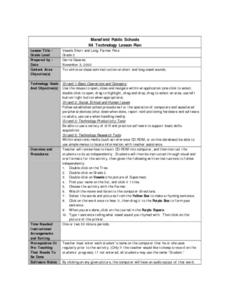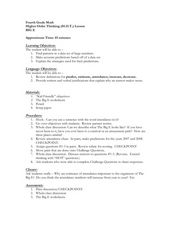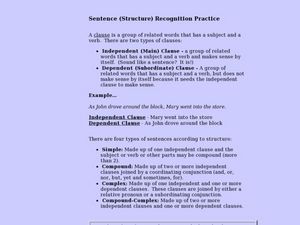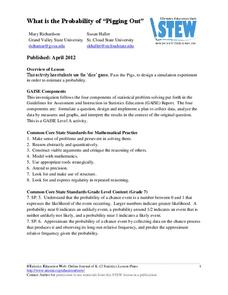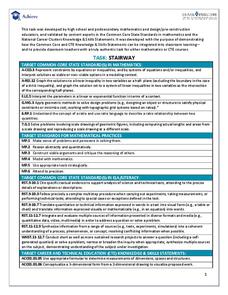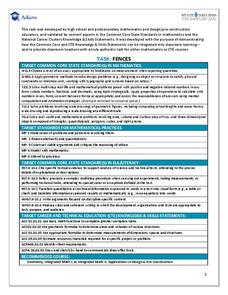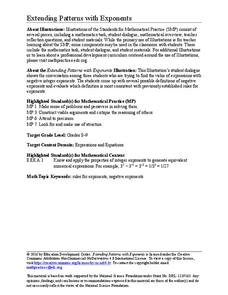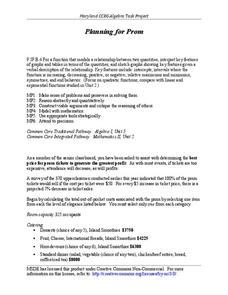Curated OER
Vowels Short And Long: Farmer Pete
Second graders study short and long vowel sounds. They hear each word or picture by clicking on it to hear each rhyme. There is also the option of letting some students type their own rhyming sentence in this program. They complete a...
Curated OER
Getting to Know You
Students read a book about understanding differences. In this getting to know you lesson, students sit in a circle, roll a ball to each other and tell one thing about themselves when they get the ball. Students read the book...
Curated OER
Social Studies: Adinkra Printing
First graders demonstrate a sense of artistic composition by creating shapes and symbols in the pattern of African Adinkra printing. They use glue to create a raised design and then print it on colored paper. Students use symbols from...
Curated OER
Vocabulary Practice
In this sentence completion worksheet, students read two choices of vocabulary words and choose the correct words to make the sentences make sense. Students choose 14 answers.
Curated OER
Higher Order Thinking (H.O.T.) Lesson - BIG E
Fourth graders work with patterns while using large numbers. In this patterning lesson, 4th graders go over the definitions of the words: predict, estimate, attendance, increase, and decrease. They complete worksheets in which they track...
Curated OER
Sentence (Structure) Recognition Practice
In this sentence clauses worksheet, sixth and seventh graders read ten sentences and write down whether the sentence is: simple, compound, complex or compound-complex.
Curated OER
Red Hot Resume
Young scholars listen to a "Help Wanted" story, paraphrase the story, and discuss vocabulary. After reading the story again, students complete a worksheet replacing the vocabulary words with their own words so that the story makes sense...
Curated OER
Describing Nests
Students observe bird nests. In this observation level, students explore bird nests using their five senses. Students compare and contrast bird nests while hypothesizing about the need birds have to construct the nest.
Curated OER
Now You See Me, Now You Don't
Bioluminescence fascinates most upper elementary scientists. Display images of different glowing deep-sea organisms and discuss their environment. Young biologists then experiment with images and different colors of filtered light. In...
Curated OER
Blind as a Bat?
Imagine using your ears and voice to see. That is what bats do with echolocation. Demonstrate how echolocation works with this fun game for your classroom. Buzz, buzz!
Inside Mathematics
Magic Squares
Prompt scholars to complete a magic square using only variables. Then they can attempt to solve a numerical magic square using algebra.
Santa Monica-Malibu Unified School District
Parts of Speech Adverbs: Building Blocks of Grammar
What is the difference between an adjective and an adverb? Encourages scholars to explore the answer to this question while building a foundation of the English language. The instructional activity comes complete with an attention...
Inside Mathematics
Squares and Circles
It's all about lines when going around. Pupils graph the relationship between the length of a side of a square and its perimeter. Class members explain the origin in context of the side length and perimeter. They compare the graph to the...
American Statistical Association
What is the Probability of “Pigging Out”
Learners apply their understanding of luck to a probability experiment. They play a game of Pass the Pigs to determine the probability of a specific outcome. Using analysis for their data, pupils declare the measures of center, dot...
Curated OER
Building Empathy Creating Community
Learners thrive in a classroom where they are part of a strong community. Foster a collaborative atmosphere in your classroom with a series of activities focused on conflict resolution, communication, empathy, and defense against bullying.
Achieve
Stairway
It's the stairway to learning! Scholars research all aspects of building a staircase. Using information from building codes, they write and graph a system of inequalities to analyze the constraints. The completed project is a scale model...
Achieve
Fences
Pupils design a fence for a backyard pool. Scholars develop a fence design based on given constraints, determine the amount of material they need, and calculate the cost of the project.
Education Development Center
Extending Patterns with Exponents
Don't think negatively about exponents. Young mathematicians dissect a fictional conversation between pupils trying to evaluate an expression with a negative exponent. This allows them to understand the meaning of negative exponents.
California Academy of Science
Food for Thought: Defining a Problem to Find a Solution
Scholars approach a problem trying to plan a meal for a class party. They learn about the restrictions and must decide what information they need to plan the meal. The first lesson in a 13-part unit on Our Hungry Planet encourages...
Howard County Schools
Planning for Prom
Make the most of your prom—with math! Pupils write and use a quadratic model to determine the optimal price of prom tickets. After determining the costs associated with the event, learners use a graph to analyze the break even point(s).
California Education Partners
Photos
Why do all sizes of pictures not show the same thing? Class members analyze aspect ratios of various sizes of photos. They determine which sizes have equivalent ratios and figure out why some pictures need to be cropped to fit...
Curated OER
Apple Addition
In this addition worksheet, students add simple one-digit numbers. They write their sum in the apple below the equation. Addition facts zero through eight are represented. Sums to extend to eighteen. Twenty-five problems are on each...
Curated OER
Digital Photography and Language Arts
First graders in groups develop a sense of story by making peanut butter and jelly sandwiches. While one student makes the sandwich, the partner takes digital pictures of the five steps involved in the process. They switch roles. The...
Curated OER
Conservation 'Ad'vice for National Parks
Students discuss ways that the public can damage as well as preserve our natural and cultural resources. Small groups are each assigned one of the national parks and must design a poster or TV commercial that celebrates the importance of...
